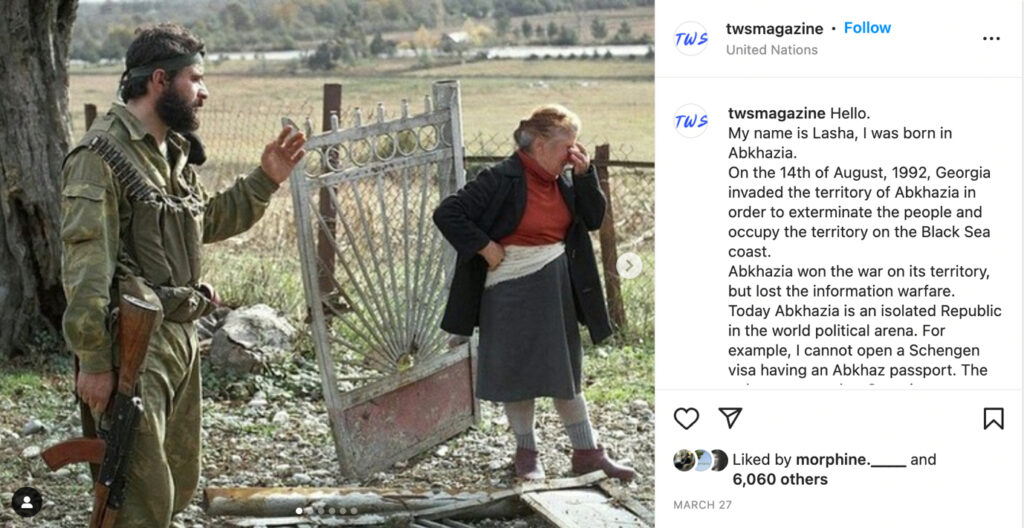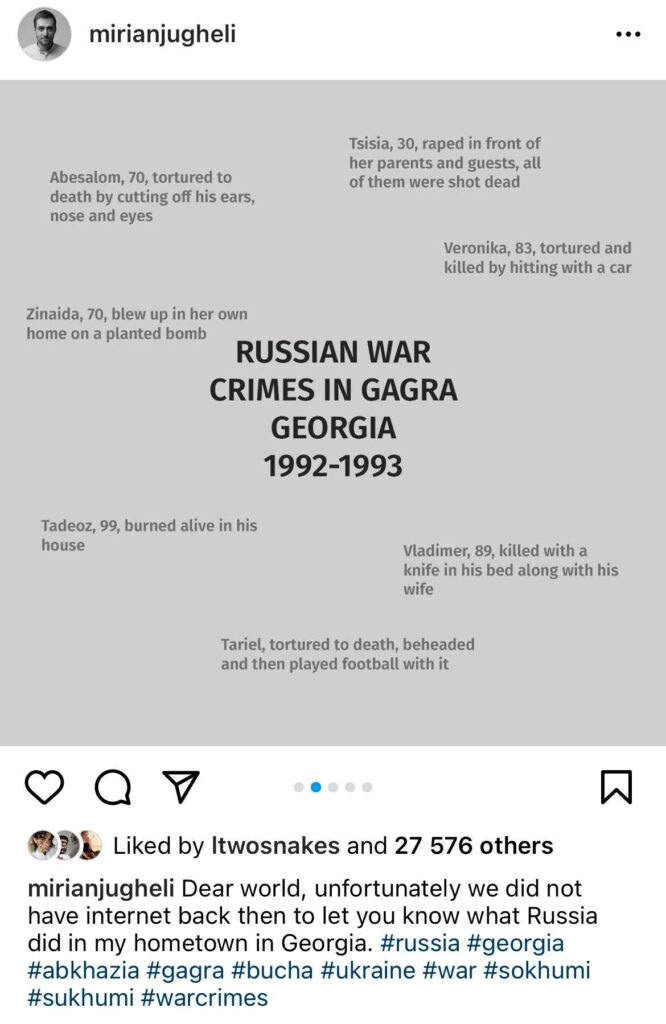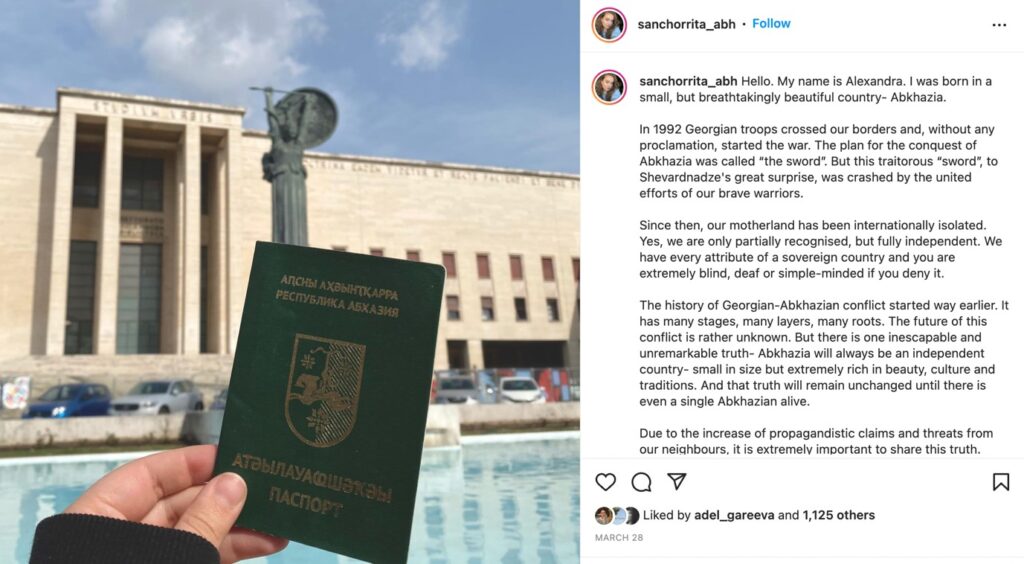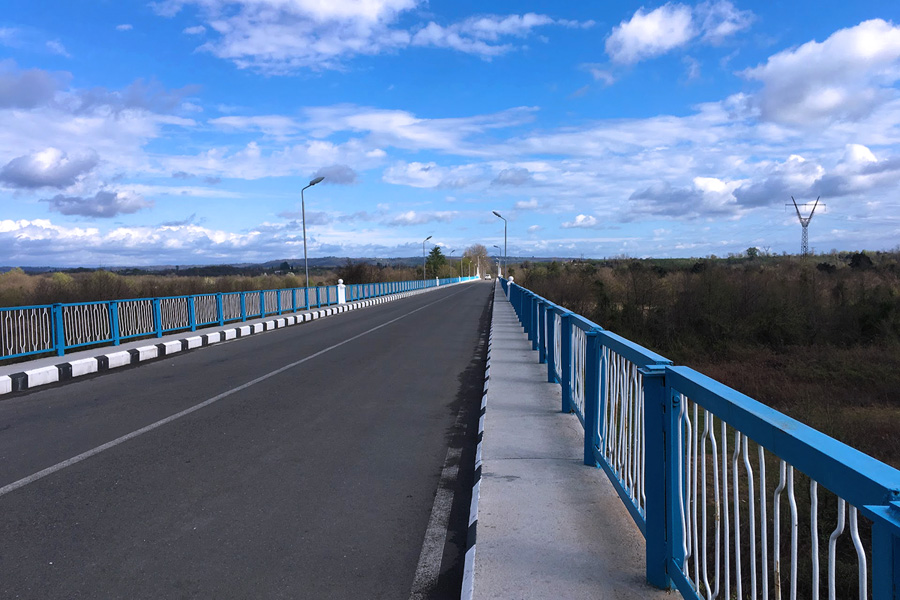The article was originally published on the website of the Georgian Foundation for Strategic and International Studies (Rondeli Foundation). The title, text, and terminology of the article have been left intact. All rights belong to Rondeli Foundation. Publication date: 2022 / 04 / 14.
Abkhaz side has become more active on social networks
Over the past two weeks, Abkhaz users have been particularly active on the issue of the Abkhazian war on popular social networks, including Facebook, Instagram and TikTok. Abkhaz society, mostly young people, post and share English and Russian language posts with hashtags – #abkhaziaisnotgeorgia, #abkhaziaisabkhazia, #weareabkhazia where they introduce themselves to the public and then tell stories about “how Georgia invaded Abkhazia to occupy it and exterminate the Abkhaz nation in 1992.”
As part of the general online campaign, these posts, as a rule, begin with a sample – My name is _name_, I was born in Abkhazia and then continue the narration about “the independent Abkhazia and war crimes committed by Georgians against Abkhazians.” There are also frequent messages that “Abkhazia is an isolated republic from the world,” “Abkhaz are a small but ancient people with their own language and culture,” “Georgians are trying to erase the history of the Abkhaz people,” “Georgians want to suppress the voice of the Abkhaz people,” “Abkhazia is neither Georgia nor Russia – Abkhazia is Abkhazia,” etc.

In parallel with the Abkhazians’ online campaign, Georgian social media users have also become more active in countering Abkhaz information warfare with “war crimes committed against Georgians” in Abkhazia, “Russia’s fight against Georgians in the Abkhazian war,” “ethnic cleansing of Georgians from Abkhazia” and other events. In this regard, a post by a Georgian user has become especially popular and garnered a lot of shares. The post talks about the “war crimes committed against ethnic Georgians” in Gagra in 1992.
The post begins with an address – “Dear world, unfortunately we did not have internet back then” and shares information about “victims of the tragic events in Gagra.” In response, following the same sample (Dear world, unfortunately we did not have internet back then…), Abkhaz users also started sharing posts about people who were “victims of Georgian aggression in Abkhazia.”

The information war between Georgians and Abkhaz on social networks is not new. However, the activities of the last few weeks overshadowed all such “explosions” in terms of scale and dynamics. On some social networks such as, for example, Facebook, posts around the issues of Abkhazia were often argued between Abkhaz and Georgian users but now this dispute has spread to almost all popular social networks. The reasons for this dynamic are obviously directly linked to the current developments in Ukraine and should be explained by the factors related to it.
Information about Russia’s military aggression in Ukraine and crimes against civilians has spread throughout the world. It is probably the most well-documented war in the history of the world and it has been the main topic on the agenda of the world’s leading television broadcasts since the end of February 2022. In this context, it is obvious that Russia’s past military campaigns returned to the forefront, including the 2008 Russian-Georgian war and the 1992-93 Abkhaz war. The international community, especially the West, has repeatedly criticized Russia for these wars, although the military adventure launched in Ukraine made the sharply negative attitude towards Russia’s aggressive foreign policy more solid and, in fact, irreversible.
Consequently, it became clear to the Abkhaz side that it completely fell into the conjuncture of Russia’s aggressive foreign policy and the chances of defending its positions to the rest of the world reduced from negligible to near zero. One of the main reasons for the activating of the Abkhaz side on social networks and launching online campaigns should be the feeling that the war started by Russia in Ukraine has completely absorbed the prospect of considering Abkhazia as an “independent case.” With the resources at their disposal, Abkhaz users are trying to send a key message to the rest of the world on social media – “that Abkhazia’s struggle for independence is more” than just Russia’s aggressive foreign policy towards its neighbors.

As Abkhaz users say in public posts, they “won the military war but made concession in the information war.” The Russian war in Ukraine reinforced this defeat in the information war. The campaign launched on social networks is also aimed at correcting this “mistake” and, according to the Abkhaz side, “bringing the truth” to the world about the Abkhazian war. As published posts and comments to these posts by Abkhaz users read, “ the events in Ukraine and the war in Abkhazia cannot be equated” because the victim of the military aggression in the second case was “the Abkhaz nation, not Georgia.” With the ongoing online campaign, Abkhaz users who are imbued with a sense of protest are confronting the intensified international discussion that Russia’s aggressive military policy began with the collapse of the Soviet Union and that Georgia was one of the first victims. According to them, the ongoing war in Ukraine further contributed to the “falsification of history” by Georgians and, in fact, the “Abkhaz nation was oppressed” in the fight for self-preservation against Georgia during the events of 1992-93. Consequently, the intensified conversations which followed the war in Ukraine about Russia’s historically aggressive role in the neighborhood, one of the most obvious examples of which is the war in Abkhazia, were perceived by the Abkhaz side as a message against them and were met with a retaliatory campaign on social media.
Abkhaz society, which thinks that Russia’s actions in Ukraine directly and badly affect their reputation, is trying to bring its own view of the inter-relationship between “aggressor” and “victim” to the world – where, in the case of the Abkhazian war, the aggressor is not Russia and the victim – not Georgia but Georgia is itself the aggressor and the victim is the Abkhaz nation. This online campaign can be considered as an attempt to confront the world-wide discourse – a discourse where Russia is the aggressor and Georgia is one of the states that is the subject of Russia’s unjust military policy.
The Kremlin’s war in Ukraine affected the whole world and Abkhazia, directly dependent on Russia, could not be an exception. Talks about the possibility of establishing the “Union State” with Russia and Belarus has also intensified in Abkhaz political circles which once again indicates that significant domestic socio-political changes are taking place in the occupied region. Against the background of large-scale domestic and foreign political upheavals, natural worries and the fear of the future intensified among the Abkhaz. Part of society has a clear perception that Russia’s actions in Ukraine significantly hinder the policy of recognizing the region and considering the historical development of the Abkhaz nation as an independent event from Moscow. The development of events forces Abkhaz users of social networks to apply all available means to defend their positions.


